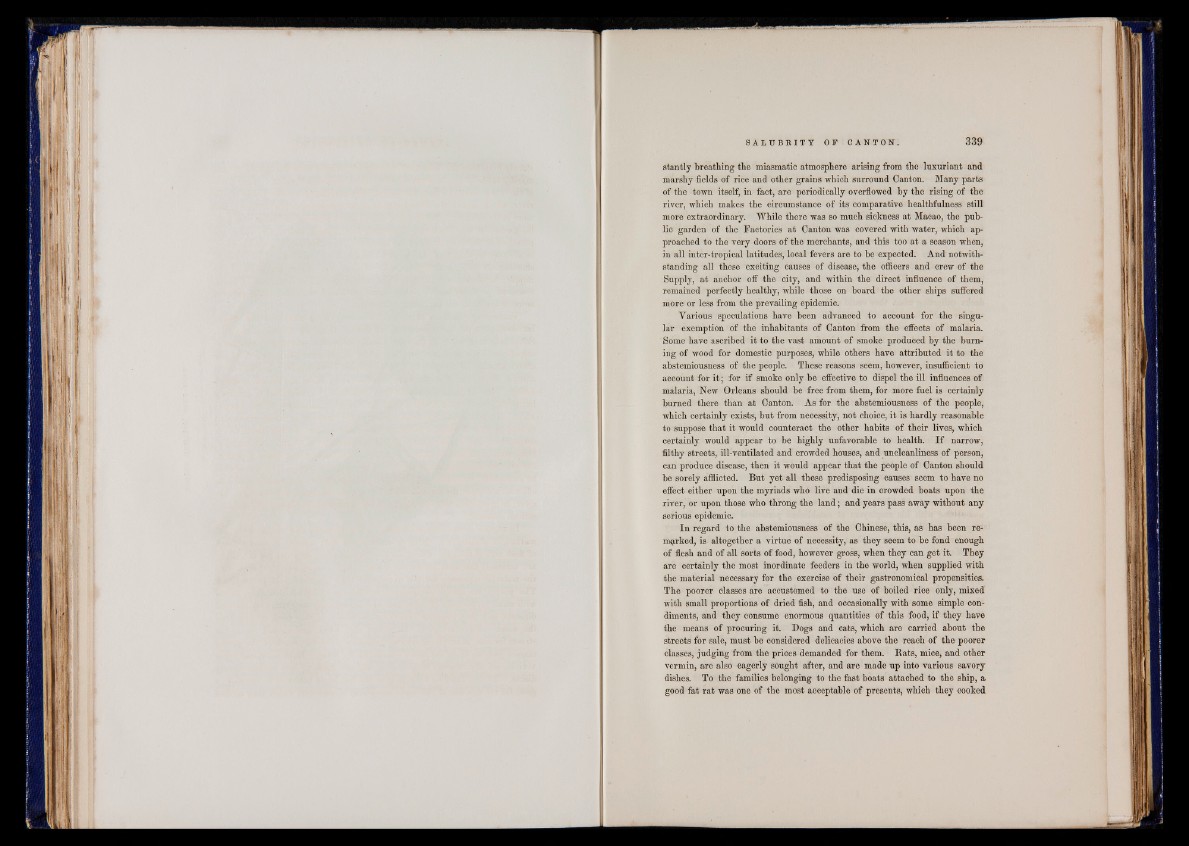
®
li
stantly breathing the miasmatic atmosphere arising from the luxuriant and
marshy fields of riee and other grains which surround Canton. Many parts
of the town itself, in fact, are periodically overflowed by the rising of the
river, which makes the circumstance of its comparative healthfulness still
more extraordinary. While there was so much sickness at Macao, the public
garden of the Factories at Canton was covered with water, which approached
to the very doors of the merchants, and this too at a season when,
in all inter-tropical latitudes, local fevers are to be expected. And notwithstanding
all these exciting causes of disease, the officers and crew of the
Supply, at anchor off the city, and within the direct influence of them,
remained perfectly healthy, while those on board the other ships suffered
more or less from the prevailing epidemic.
Various speculations have been advanced to account for the singular
exemption of the inhabitants of Canton from the effects of malaria.
Some have ascribed it to the vast amount of smoke produced by the burning
of wood for domestic purposes, while others have attributed it to the
abstemiousness of the people. These reasons seem, however, insufficient to
account for i t ; for if smoke only be effective to dispel the ill influences of
malaria, New Orleans should be free from them, for more fuel is certainly
burned there than at Canton. As for the abstemiousness of the people,
which certainly exists, but from necessity, not choice, it is hardly reasonable
to suppose that it would counteract the other habits of their lives, which
certainly would appear to be highly unfavorable to health. I f narrow,
filthy streets, ill-ventilated and crowded houses, and uneleanliness of person,
can produce disease, then it would appear that the people of Canton should
be sorely afflicted. But yet all these predisposing causes seem to have no
effect either upon the myriads who live and die in crowded boats upon the
river, or upon those who throng the land; and years pass away without any
serious epidemic.
In regard to the abstemiousness of the Chinese, this, as has been remarked,
is altogether a virtue of necessity, as they seem to be fond enough
of flesh and of all sorts of food, however gross, when they can get it. They
are certainly the most inordinate feeders in the world, when supplied with
the material necessary for the exercise of their gastronomical propensities.
The poorer classes are accustomed to the use of boiled rice only, mixed
with small proportions of dried fish, and occasionally with some simple condiments,
and they consume enormous quantities of this food, if they have
the means of procuring it. Dogs and cats, which are carried about the
streets for sale, must be considered delicacies above the reaeh of the poorer
classes, judging from the prices demanded for them. Rats, mice, and other
vermin, are also eagerly sought after, and are made up into various savory
dishes. To the families belonging to the fast boats attached to the ship, a
good fat rat was one of the most acceptable of presents, which they cooked